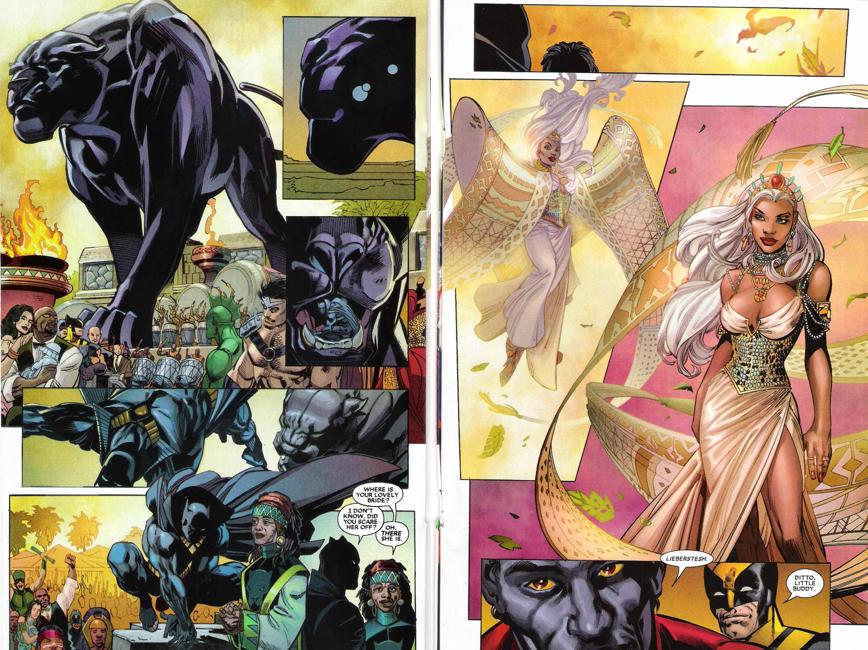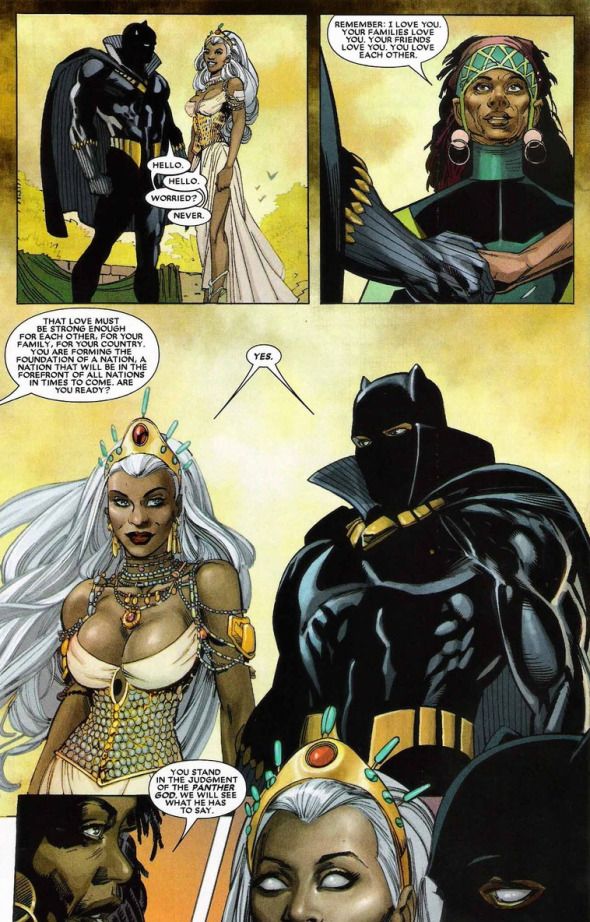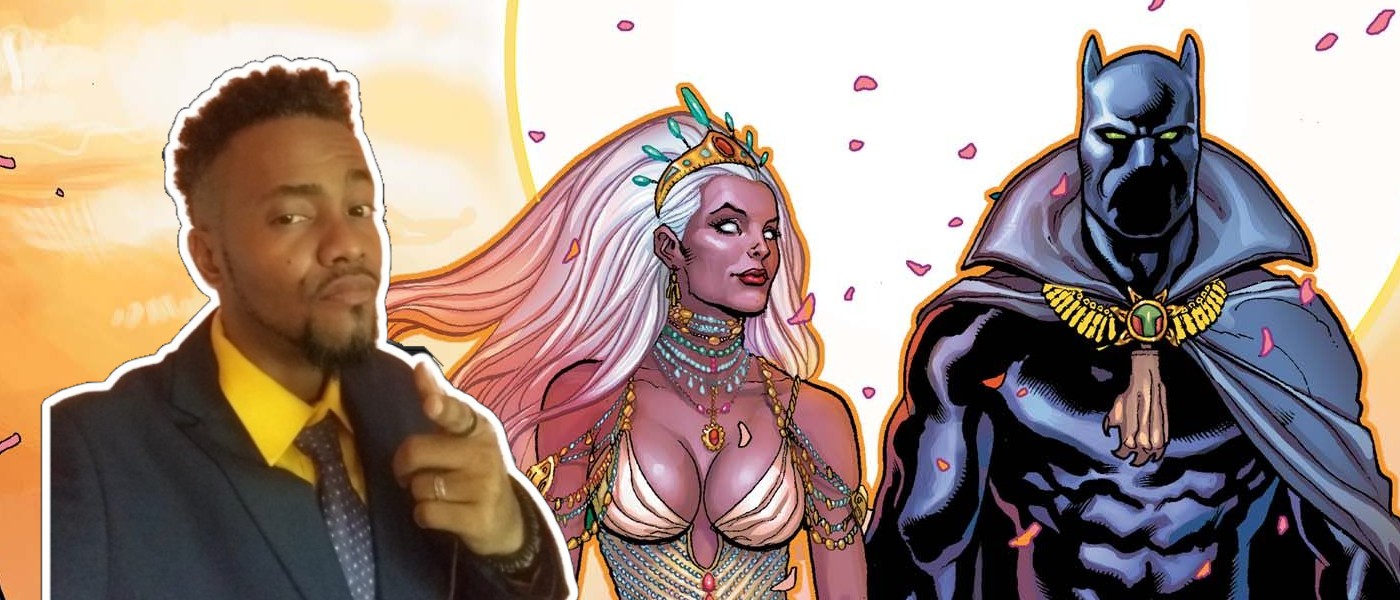A Marriage Beyond Fantasy
When Ororo Munroe, also known as Storm, and T’Challa, the Black Panther and King of Wakanda, were wed in Black Panther Vol. 4 #18 (2006), the event marked more than a simple union of two fictional characters. It was a symbolic milestone—a marriage of African royalty and diasporic divinity, of mutant resistance and sovereign leadership, and of African and African-American identities within the Marvel Universe.
As a college professor and counselor who has worked with youth of African descent for over 15 years, I found their marriage deeply resonant. It offered a rare and powerful image of Black love, Black leadership, and Black unity. More importantly, it challenged dominant narratives in both pop culture and politics, offering a layered depiction of identity, diplomacy, and emotional vulnerability.
Cultural Representation and the Power Couple Archetype
Storm and Black Panther are among the most powerful Black superheroes in comic book history. Individually, they symbolize control over nature and mastery of technology; together, they became the Marvel Universe’s first major Black “power couple.”

Their union brought together two symbolic traditions: Storm, a goddess-like mutant born to Kenyan royalty and raised in Harlem, and Black Panther, the king of the most technologically advanced nation on Earth. This was not merely a romantic storyline. It was a celebration of Black excellence, strength, and dignity. As Johnson (2007) notes in Ebony magazine, “This union tells our kids that royalty and righteousness are not mutually exclusive.”
Marvel amplified the event with fanfare that extended beyond the pages of comics. The wedding made headlines in USA Today, CNN, and Essence, signaling its cultural relevance (USA Today, 2006). It also inspired fan art, online discourse, and even discussions about representation in mainstream superhero narratives.
Symbol of Unity and Pan-African Possibility
Thematically, Storm and Black Panther’s marriage represents Pan-African unity. Storm, with her American upbringing and African ancestry, returns to the continent as queen of Wakanda. This narrative arc echoes diasporic dreams of return, reconnection, and healing.
Their union also linked two prominent Marvel factions: the X-Men (representing the marginalized and persecuted) and Wakanda (a sovereign, independent Black nation). As such, it served as a bridge between two spheres of resistance, offering a symbol of solidarity amid systemic injustice. According to Nama (2011), the couple’s marriage reflects “a utopian convergence of African cultural pride and African-American political struggle.”
Cultural Exchange and Identity
The marriage created opportunities to explore cultural exchange. Storm adapted to the protocols and politics of Wakandan royalty, while maintaining her fierce independence and mutant identity. The tension between her goddess persona and her diplomatic responsibilities as queen created powerful internal conflict.

This cultural interplay highlighted the richness of African tradition and the complexity of diasporic identity. In one arc, Storm is challenged by Wakandan elders who question her foreign roots. These moments resonate with real-world tensions around Blackness, authenticity, and belonging, particularly for people navigating multiple cultural worlds.
Diplomatic and Narrative Impact in the Marvel Universe
The marriage wasn’t just personal—it was political. It forged alliances between Wakanda and the mutant community and generated plotlines involving the Avengers, the X-Men, and the Fantastic Four. During the Civil War storyline, Storm and T’Challa played mediating roles between warring factions, using their status as heads of state to propose peace.
This arc introduced political intrigue, governance struggles, and ethical dilemmas. How does one rule a kingdom and remain loyal to one’s people while also being tied to global politics? Storm and T’Challa were no longer just superheroes—they became heads of state, confronting issues that mirrored real-world postcolonial and geopolitical tensions.
Personal Growth and Emotional Depth
Storm and Black Panther’s union allowed both characters to evolve. T’Challa showed a more vulnerable side, wrestling with the tension between love and duty. Storm had to reconcile her warrior spirit with her new role as queen and diplomatic figure.
Their relationship gave emotional texture to otherwise stoic characters. From a counseling perspective, this depiction of love was crucial: it modeled mutual respect, emotional interdependence, and the challenges of intimacy within leadership.
Unfortunately, like many high-stakes relationships, their marriage faced tremendous strain. Political upheaval, war, and philosophical differences led to their tragic separation during the Avengers vs. X-Men storyline (2012). Yet even in its end, the relationship remained respectful and significant, preserving the characters’ dignity and growth.
Media Coverage and Cultural Resonance
The wedding’s significance extended well beyond comic fans. Major outlets like CNN and NPR discussed the cultural meaning of this union. In a 2006 feature, NPR called it “a landmark moment in pop culture representation” (NPR, 2006). Essence ran features celebrating the imagery of Black love, royalty, and mutual empowerment.
These conversations mattered. In an industry where Black love is often invisible or troubled, seeing two powerful Black figures choose each other—on equal footing—was revolutionary.
Philosophical Reflection: Unity, Identity, and the Heroic Self
Storm and Black Panther’s marriage speaks to deeper philosophical questions. What does it mean to merge one’s identity with another’s? Can love bridge worlds divided by culture, power, or ideology?
In the Aristotelian sense, theirs was a friendship of virtue: based not on utility or pleasure, but on mutual admiration and a shared moral vision. Yet, as with all great philosophical love stories, their union was also a site of tension, transformation, and the pursuit of a higher good.
From my perspective as a counselor, their story reflects the real-life challenges of partnerships between powerful individuals: the need to balance independence with interdependence, ambition with affection, and tradition with progress.
A Union Worth Remembering
Storm and Black Panther’s marriage was short-lived, but its impact endures. It offered readers—especially Black readers—an image of love that was regal, passionate, and deeply principled. It fused myth with meaning and gave us a vision of what Black unity, in all its complexity, could look like.
As the Marvel Universe continues to evolve, one hopes that the lessons of this union—of mutual respect, cultural pride, and shared purpose—will remain a guiding light. Their story reminds us that Black love is not just powerful—it is world-changing.
References
Johnson, K. (2007). Black Love in the Marvel Universe. Ebony, 62(3), 34–36.
Nama, A. (2011). Super Black: American Pop Culture and Black Superheroes. University of Texas Press.
NPR. (2006, July 24). Black Panther Weds X-Men’s Storm. https://www.npr.org/templates/story/story.php?storyId=5578337
USA Today. (2006, July 17). Comic Book Wedding Unites Two Superheroes. https://usatoday30.usatoday.com/life/books/news/2006-07-17-storm-blackpanther_x.htm
Marvel Comics. (2006). Black Panther Vol. 4 #18. Marvel Entertainment.
Marvel Comics. (2012). Avengers vs. X-Men #9. Marvel Entertainment.
